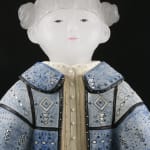vivian wang China, b. 1945
Blue Girl, 2024, SOLD
Cast glass, Stoneware, Gemstones
24"H (with pedestal) x 11.5"W x 12.5"D
Copyright The Artist
Further images
BLUE GIRL portrays a young lady from an extremely wealthy Native American community, the Shakopee Mdewakanton Sioux Community southwest of Minneapolis. Their name means “dwellers at the spirit waters.” Her...
BLUE GIRL portrays a young lady from an extremely wealthy Native American community, the Shakopee Mdewakanton Sioux Community southwest of Minneapolis. Their name means “dwellers at the spirit waters.”
Her clothing, decorated with Native American motifs, has an added “sparkle” (gemstones), an opulence reflecting their great wealth. Though she is dressed in contemporary attire, traditional tribal dress is still worn for ceremonial events. Her hairstyle of two side buns indicates her single marital status.
Tribal members are direct linear descendants of the Mdewakanton Dakota people who, for centuries, resided in villages near the banks of the lower Minnesota River. In the 1800s, the Federal Government seized their land resulting in the US-Dakota War of 1862. In 1886, reservations were established for the Dakota people where they endured hardship and poverty for almost one hundred years.
In 1969, the Shakopee Mdewakanton Sioux Community finally gained recognition as a tribe. This allowed them to develop their own government and economic system. In 1982, the tribe opened the Little Six Casino and, in 1992, the Mystic Lake Casino. Investments were also made in other businesses. Today, their community is worth 2.7 billion dollars. With only 480 members, they are by far the wealthiest tribe per capita in the United States.
Her clothing, decorated with Native American motifs, has an added “sparkle” (gemstones), an opulence reflecting their great wealth. Though she is dressed in contemporary attire, traditional tribal dress is still worn for ceremonial events. Her hairstyle of two side buns indicates her single marital status.
Tribal members are direct linear descendants of the Mdewakanton Dakota people who, for centuries, resided in villages near the banks of the lower Minnesota River. In the 1800s, the Federal Government seized their land resulting in the US-Dakota War of 1862. In 1886, reservations were established for the Dakota people where they endured hardship and poverty for almost one hundred years.
In 1969, the Shakopee Mdewakanton Sioux Community finally gained recognition as a tribe. This allowed them to develop their own government and economic system. In 1982, the tribe opened the Little Six Casino and, in 1992, the Mystic Lake Casino. Investments were also made in other businesses. Today, their community is worth 2.7 billion dollars. With only 480 members, they are by far the wealthiest tribe per capita in the United States.
1
of
11








